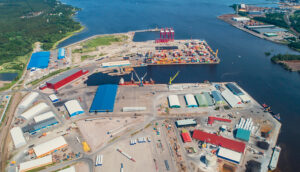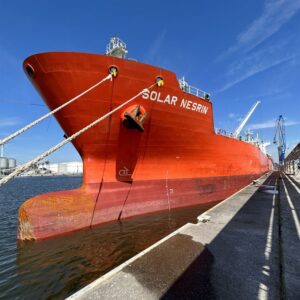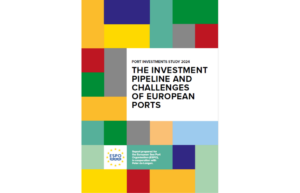Russian drones have hit Ukraine’s main inland port and grain silo across the river Danube in the southern Odesa region, sparking increases in global food prices.
The latest attack on the Port of Izmail follows Russia’s recently imposed Black Sea blockade that formerly enabled safe grain export between both countries across the Black Sea.
Refusal to renew the deal has subsequently stifled Ukraine’s shipping operations, especially the transportation of their globally demanded grain.
Following the deals collapse, Ukrainian officials have accused Russia of targeting 26 port facilities, along with five civilian vessels, and 180,000 tonnes of grain in the past two weeks, Reuters reported.
The recent strikes have caused significant damage to buildings at the Port of Izmail, leading to the suspension of its operations.
Additionally, commercial ship tracking data indicated that several international vessels destined for the port had to drop their anchors at the mouth of the Danube in response to the attack.
No casualties have been reported, however, Reuters stated that the attacks have damaged 40,000 tonnes of grains destined for exports to Africa, China, and Israel, according to Ukrainian Deputy Prime Minister, Oleksandr Kubrakov.
The targeted port, across the river Danube close to EU and NATO member, Romania, became the main alternative route for grain exports following Russia’s naval blockade.
Notwithstanding this river route, the blockade brought about concerns that Ukraine’s grain exports will decrease by an additional 50 per cent. Moreover, opting for this alternative route incurs higher logistical costs, according to the BBC.
READ: Russian invasion causes HHLA’s Odessa throughput to plummet
The attack had an immediate and evident impact on global markets, leading to an almost 5 per cent surge in wheat trading in Chicago, reported the Financial Times. Additionally, maize prices rose by over 2 per cent, and soybean oil prices increased by 0.3 per cent, further exacerbating worries about rising global food prices.
Moscow has held that the attacks were in response to Ukrainian strikes on a vital bridge to Crimea, which serves as a crucial supply route for their troops in southern Ukraine. Now, Moscow has taken the stance that any ship heading to Ukrainian seaports will be considered a potential military target.
Despite accusations from Western states of ‘weaponising’ food, Russian President, Vladimir Putin, reiterated his conditions in a phone call with the grain export deal’s sponsor, Turkish President Tayyip Erdogan.
Debilitated by sanctions, Moscow has expressed its frustrations with its shackled ability to export, especially considering that Russia too is among the biggest exporters of grain.
The Kremlin has maintained its position in demanding the implementation of a parallel deal that improves, safeguards, and guarantees its own food and fertiliser exports. Erdogan, however, expressed his desire to host Putin with the hope of persuading him to rejoin the grain deal, the BBC reported.
READ: CMA Terminals to divest Russian investments in Global Ports share swap
Ukraine is among the biggest global exporters of wheat and corn, reported the BBC.
In the wake of the damage caused to grain exports at the Ukrainian port, global food security concerns have once again heightened with France’s Foreign Ministry accusing Russia of intentionally jeopardising global food security.
READ: Russia-Ukraine conflict boosts Port of Riga box throughput
Putin, however, denounced the humanitarian intent of the deal in an article released on 24 July where he stated: “The West has completely emasculated and perverted this essence, and instead of helping countries in real need, the West used the grain deal for political blackmail.”
Moreover, FourKites data from March this year showed that the ongoing conflict between Russia and Ukraine has had a significant impact on the supply chain, especially in the warzone where the safety of transportation is the top concern.









